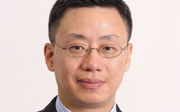 King Lun Au of BOCHK Asset Management, talks to Stefanie Eschenbacher about his new affiliations, product developments and why he would rather not promote his brand to a wide investor base through Ucits.
King Lun Au of BOCHK Asset Management, talks to Stefanie Eschenbacher about his new affiliations, product developments and why he would rather not promote his brand to a wide investor base through Ucits.
Targeting institutional investors in the Middle East, BOCHK Asset Management has recently signed Alternative Investment Management Product as distributing partner.
It is close to signing another deal with a partner for retail coverage, also in the Middle East, and is having advanced talks with potential partners in Europe and Asia.
“This will allow us to cover another area where demand for high-quality renminbi fixed income investment has been increasing,” says King Lun Au, chief executive officer.
Au says there is demand for renminbi income investment globally and the new partnership in the Middle East is part of an initiative to establish renminbi fixed income as a global asset class for institutional and individual investors.
Alternative Investment Management Product is an asset management marketing and relationship group that helps asset managers develop their institutional relationships in the Middle East. It is headquartered in Jersey.
Last November, BOCHK Asset Management signed a memorandum of understanding with Fubon Asset Management on a strategic partnership for an exclusive co-operation in investment advisory and business development in Taiwan.
BOCHK Asset Management will be the sole manager for Fubon Asset Management’s offshore renminbi investments; they, in turn, will be the sole distributor.
Au says in Taiwan it was easier to do business than elsewhere in terms of regulation and compliance. Many of his peers have set up Ucits funds and marketed them to foreign investors under their own brand.
However, Au says he would rather work closely with a few selected partners on an exclusive basis than try to promote an unknown brand to a wide investor base through Ucits.
WIN-WIN OPPORTUNITY
Ucits, he adds, work well if the asset manager is already an established player that does not have to spend time and resources promoting the brand. “It will take at least a year to make investors comfortable with a brand,” he says.
Investors in Europe will typically consider only funds that have established at least a three-year track record and are rated by one of the major agencies.
Although Au concedes that the ability to promote his own brand name will be compromised, he says it is a win-win opportunity for both parties.
He says trying to build a strategy in a place like Taiwan is risky for a start-up company. “We have the endorsement of a local, established manager,” he says. “No matter how good an asset manager is, it can never compete with an established one, like Fubon.
“We are not local experts when it comes to local distribution and client servicing so we can leverage on their capability. Developing our Hong Kong business is challenging enough.”
In Europe, Au and his colleagues have a strategic partnership with private bank Sal. Oppenheim, which is headquartered in Cologne, Germany.
In the past year, he says, it has become more obvious that the Chinese government is going to pursue a strategy that will internationalise the renminbi further.
“We would like to expand rapidly in certain regions, but the market has to be ready,” he says, adding that while interest in renminbi has picked up worldwide, some investors still need educating.
Encouraged by investor demand, Au and his team are currently working with a large, independent index provider on a series of renminbi fixed income bond indices.
In March, it launched the BOCHK All Weather RMB High Yield Bond Fund, its first high yield bond fund, onshore. An offshore Cayman Islands version was launched in mid-2011 for high-net-worth individuals and private bank clients.
“At the moment, the renminbi is seen as an alternative asset class,” he says. “Investors are not going to put in a large amount of money into renminbi, but they will diversify.”
Au says the fact that the renminbi is controlled by the government makes it a stable currency that offers certainty.
It is exactly that level of government involvement that would worry some investors, but Au points out that China is not the first country where the government controls the currency.
The renminbi is still not fully convertible; access to the currency outside offshore renminbi trading centres is possible, but limited. Offshore renminbi deposits are growing quickly, albeit from a low base, in major financial cities such as London and Paris.
Hong Kong, Macau, Taiwan and Singapore are the offshore clearing centres for renminbi and Au predicts that London is likely to become the first renminbi trading centre in Europe. There is a rising interest in the Middle East, too, he adds.
The recent rise in demand for renminbi fixed income products has created an impression among investors that his focus is purely in that asset class. Though it offers equity funds, too.
Au says there are plans to launch a Hong Kong and China equity product later this year. Once qualified, Au intends to apply for a renminbi qualified foreign institutional investor (RQFII) quota to be able to attract offshore renminbi to buy A shares and the onshore bond markets.
The Greater China region is as far as he intends to go in terms of investment destinations, at least for now.
“We do not claim to have overseas stock-picking capability,” he says. “Hopefully, at some point in the future, with our overseas partners, we will have.”
Au does not look towards exchange-traded funds (ETFs) or hedge funds, either. “There are already ETFs out there and I do not think we can add to the market. Indexation, to me, is a volume game.”
CRITICAL MASS
Au says ETFs are not complex products and barriers to entry are low, but the question is whether they can bring in sufficient scale to be successful.
Hedge funds are another area he feels the business is not ready for. Even though the skill set to manage such strategies is in-house, Au says there are no resources for building and distributing hedge funds.
Au says “almost everything one can think of” is outsourced: finance, IT, human resources and asset servicing. He manages a 17-strong team, focusing entirely on investment and business development.
Elsewhere in the industry, Au was key in working on a proposal for a fund passport between Hong Kong and China.
“I am pleased that the Hong Kong government put forward a proposal to China’s regulators for mutual fund recognition of public funds between Hong Kong and China,” he says.
It would be a significant step for Hong Kong if locally domiciled funds could be sold into mainland China.
Once Hong Kong has reached critical mass, he says, it can become the fund administration centre for Asia. “China is the largest catalyst for this.”
©2013 funds global asia

 At times like these, HSBC Asset Management easily pivots towards emerging markets.
At times like these, HSBC Asset Management easily pivots towards emerging markets. A comprehensive, cost-effective, and transparent currency overlay hedging solution is crucial to mitigate FX exposure risks in the complex landscapes of Japan and China's FX markets, explains Hans Jacob Feder, PhD, global head of FX services at MUFG Investor Services.
A comprehensive, cost-effective, and transparent currency overlay hedging solution is crucial to mitigate FX exposure risks in the complex landscapes of Japan and China's FX markets, explains Hans Jacob Feder, PhD, global head of FX services at MUFG Investor Services. The world is transitioning from an era of commodity abundance to one of undersupply. Ben Ross and Tyler Rosenlicht of Cohen & Steers believe this shift may result in significant returns for commodities and resource producers over the next decade.
The world is transitioning from an era of commodity abundance to one of undersupply. Ben Ross and Tyler Rosenlicht of Cohen & Steers believe this shift may result in significant returns for commodities and resource producers over the next decade. Ross Dilkes, fixed income portfolio manager at Wellington Management, examines the opportunities and risks for bond investors presented by the region’s decarbonisation agenda.
Ross Dilkes, fixed income portfolio manager at Wellington Management, examines the opportunities and risks for bond investors presented by the region’s decarbonisation agenda. Shareholders in Japan no longer accept below-par corporate governance standards. Changes are taking place, but there are still areas for improvement, says Tetsuro Takase at SuMi Trust.
Shareholders in Japan no longer accept below-par corporate governance standards. Changes are taking place, but there are still areas for improvement, says Tetsuro Takase at SuMi Trust. Robert St Clair, head of investment strategy at Fullerton Fund Management, explores the reasons investors should be paying attention to the rising demand for healthcare in China.
Robert St Clair, head of investment strategy at Fullerton Fund Management, explores the reasons investors should be paying attention to the rising demand for healthcare in China.


